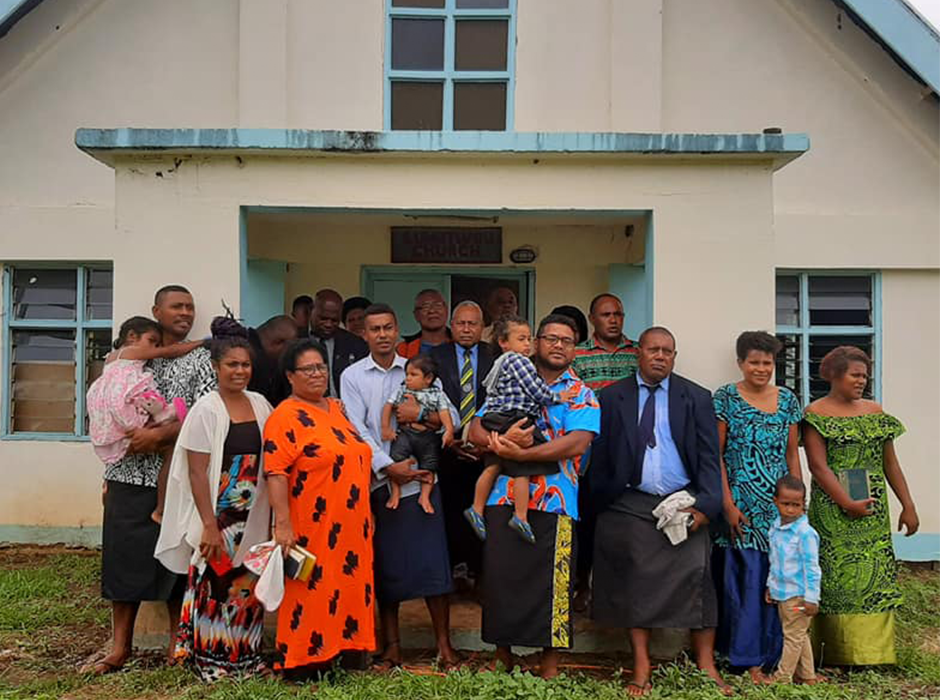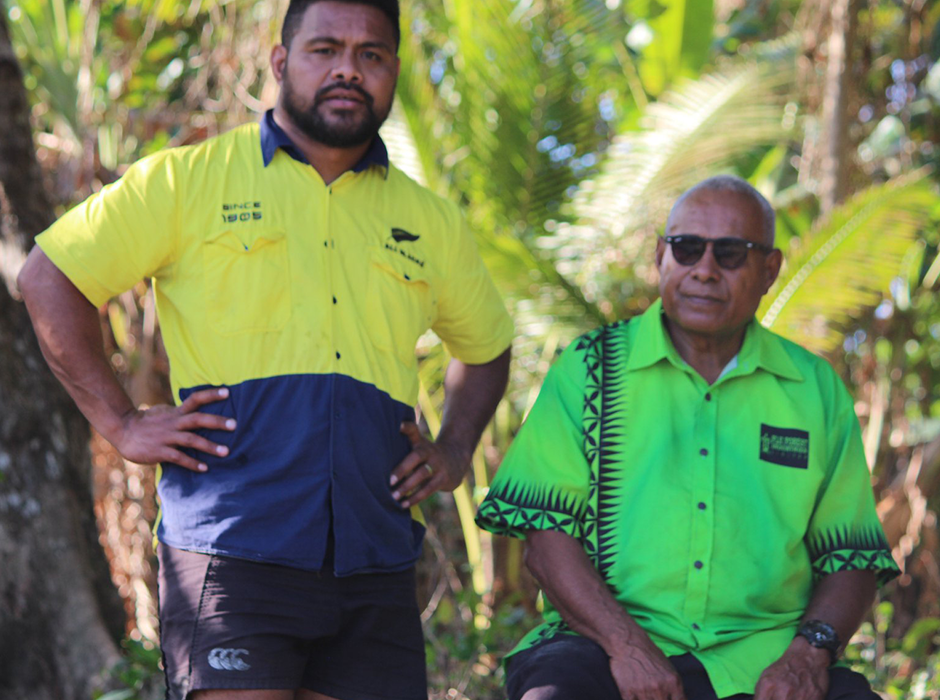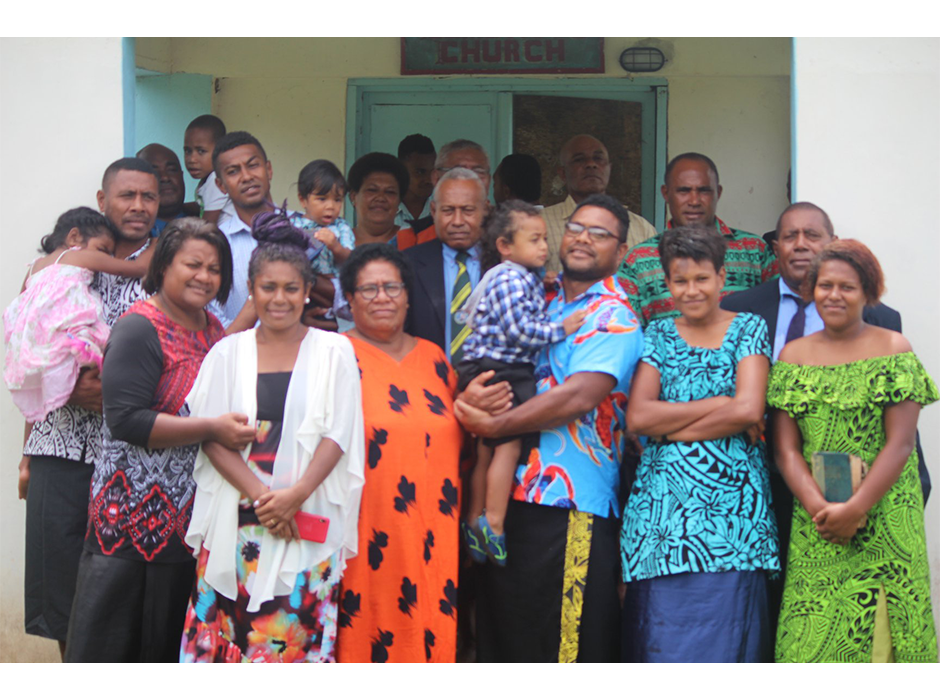
Jekope, fourth from the right, with his family in Fiji.
Jekope Maiono made a promise to his grandfather that he would be the first in their family to get a university degree. Jekope fulfilled that promise when he finished his Bachelor of Commerce in management in 2013. Since then, he has gone on to complete a Master’s degree in sustainable business and a Post Graduate Certificate in health sciences.
And this Saturday, Jekope will cross the stage at the Dunedin Town Hall for the fourth and final time to collect his PhD in Sustainable Land Development in Fiji, rounding out 13 years of studying at Otago.
Jekope came to Aotearoa New Zealand from Fiji in 2006 to play rugby for a team based in Lawrence, South Otago. He had “never heard of Otago University”.
“But after a couple of years, I realised that I’m in a unique situation, which was personal. I made a promise to my grandfather to be the first in my family to finish a degree.”
Jekope believes there are people who will carry you through different phases of your life.
“There are people that came through my life that opened those doors for me, they come and tell you ‘you actually can do it’.”
He’s the first person from his home island of Cikobia on to go to university.
“When we sit around our dinner table, when we have a village gathering, we don’t have a doctor there. We never knew that these people do exist in our space.”
Moving to Ōtepoti, he found himself surrounded by academics every day.
“You talk to them, you come to university and you start interacting with them so it becomes real for you.”
He’s grateful to Professor Sara Walton and Associate Professor Diane Ruwhiu for telling him he could complete a PhD.
“They opened those doors, they enabled me.”

Jekope, left, with his grandfather Waqa Camaicolo. Photo as supplied by Jekope.
The three years during which he completed his PhD were “never easy”, he says.
“It was probably one of the intense moments of my life, it tested every aspect of me. It redefined who I am, I see things differently.”
Many aspects of his life, including family life, were tested, he says.
“People around you start to look at you differently because you start to frame yourself in a way that ‘this is something that I want to do’. And in order for me to achieve this, you have to say no to things to be something that you want to be.
“And that wasn’t easy.”
“I guess I’m blessed to be in a position where I am today, with so many people who helped me along. And I want to be that person who also gives back.
His ties to Cikobia have remained strong, despite moving to Aotearoa. In the past 13 years, Jekope has returned home several times to help the village, which he based his master’s and PhD research on.
“If I can be of help to only a small group of people from where I come from, then I think I fulfilled my life goal in this world.
“I don’t have to save the whole world, just this little, tiny island in the middle of the Pacific Ocean.”
The Otago Bulletin spoke with Jekope when he completed his master’s degree in 2017. At the time, he was working to get a jetty and shed built at his home village Vatulele, on the island of Cikobia.
Jekope followed that project through to completion and since then he’s helped organise the planting of thousands of pine trees.
He was also instrumental in securing funding from United Nations Development Business to install 17 water tanks because “they desperately need water supply”.
“The women will not have to walk for three or four kilometres every morning to fetch water from the well.”
He says eventually everyone will have their own water tank at their house.
“These are the little things that we are trying to do.”

Jekope is glad he help the community of his home village Vatulele, on the island of Cikobia, Fiji.
He encourages the people of his village to look at the land and see how much has changed in the past five years.
“The changes are slowly happening. In the next five years from now, you see those pine trees, they’ll become big trees.”
So far, he says, things have been moving “in the right direction”. The community is in a good position because it is starting from scratch.
“We are building something from the ground up nothing existed in that space.”
Village elders asked Jekope to come up with a way to enhance sustainable livelihood in the village, and he used that opportunity to educate himself.
“That is part of the reason why I go on and study and do the masters, do the PhD. I believe that if I can look after me, look after my knowledge base, I’ll be in a really good position to make some tangible impact on the people of the land.”
Jekope wants to not only help his community in Fiji live sustainably but also look at ways they can use their natural resources such as coconut crab, prawns, sea cucumber and fish in a more sustainable way. That is, not just “harvesting anything that they can” but harvesting only what they need.
“[I’m] telling them ‘go back to the way our ancestors used to do, only take what you need for that time’.”
Jekope has also spent a lot of time changing the community’s mentality around the formalisation of social structure.
“In the Fijian context, there are already existing social systems that are established within villages, but in order to leverage that you need to use those social systems as a business structure so that the community can be recognised by government agencies, funding agencies, financial institutions.”
Jekope handed his PhD thesis in in July 2023. He has held the role of the University’s Pacific Island Student Support Facilitator for five months now.
“It’s really good, I’m learning a lot,” he says.
He is writing an indigenous business case for the business school, to better explain things students should consider before conducting business with people from the Pacific community such social capital and whanaungatanga - forming relationships which are “fundamental”.
“I think that is the challenge that we face at the business school, is that we do not have a Pacific business case, a Māori business case or an indigenous business case available.”
In Aotearoa, students need to consider Māori and Pacific world views. This inclusivity gets students thinking outside the normal way of framing ‘how to do business’, he says.
-Kōrero by internal communications adivsor, Koren Allpress